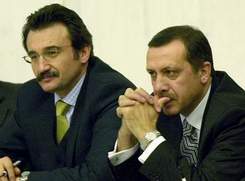 |
 |
Turkish PM Recep Tayyip Erdogan
(R) with his deputy Mehmet Ali Sahin at the Parliament in
Ankara on Friday.
(Photo: AP) |
 |
Kurdish forces in northern Iraq
denied on Saturday that Turkey had sent a vanguard of commandos
across the border overnight, saying that any incursion would have
been resisted by Kurds.
"If any Turkish troops had entered
Iraq you would hear the fighting. We are not going to roll out the
red carpet for them," a senior Kurdish military official told
Reuters.
"The first step they take into the country the
fighting would start. Our troops have been ordered to shoot to
kill," he said. "The only way they can come in is in coordination
with the U.S. forces" invading Iraq.
Earlier, a Turkish
military source told Reuters that about 1,500 commandos crossed
Turkey's southern border at three points late on Friday, aiming to
secure access for subsequent, larger deployments.
The United
States has told Turkey that it would not welcome a large unilateral
incursion into northern Iraq, where Kurdish authorities are
suspicious of Turkish motives. Turkey says the action is to hinder
attempts to create a Kurdish state and prevent the arrival of Iraqi
Kurdish refugees on its territory.
"Turkish units have begun
crossing into northern Iraq to take security measures at various
points," the official said.
"These units will secure the
safety of units that will follow. Further crossings will take place
at various intervals," he said. He gave no timetable.
There
had been a small garrison of Turkish troops in northern Iraq for
many years, to fight Turkish Kurdish rebels based there.
The
move comes shortly after Turkey said its troops would enter northern
Iraq to prevent an influx of refugees across its borders.
Deputy Prime Minister Mehmet Ali Sahin said that Turkey was
expecting up to 250-300 thousand Iraqi refugees to flee toward the
country. In an effort to deal with such an eventuality, Turkey
established refugee camps in its territory and in northern Iraq
before the war began.
Turkey's armed forces would also enter
the Iraqi Kurdish enclave to prevent "terrorist activity," Turkish
Foreign Minister Abdullah Gul told reporters at a news conference.
Turkey had no designs on Iraqi territory, he added.
U.S. granted use of Turkish airspace
Also Friday,
Turkey agreed to allow U.S. warplanes to overfly Turkish territory
in attacks on Iraq, after failing to link the issue to free access
for its troops to Iraq.
The United States insists the two
issues should not be
linked.
U.S. officials said Turkey
delayed opening its airspace to U.S. warplanes for despite
parliamentary approval for the overflights, insisting the United
States agree to its demands to move troops into northern Iraq.
Thursday's vote by the Turkish parliament granting
overflight rights follows intense lobbying by the U.S., but falls
far short of Washington's original request to send 62,000 soldiers
to Turkey to open up a northern front against Iraq that would divide
the Iraqi army.
Polls show up to 94 percent of Turks are
against a war against Iraq, opposition that contributed to months of
delays by Turkey's government.
U.S. State Department
spokesman Richard Boucher welcomed the vote granting airspace
rights, but said the United States remained "opposed to unilateral
action by Turkey or by any party in northern Iraq."
Parliament earlier this month failed to pass a resolution
that would have let in U.S. ground troops for an Iraq invasion.
Washington had offered Ankara a package of $15 billion in
loans and grants if it lets in U.S. troops for a ground war. But the
American aid package was withdrawn as war drew closer and it became
clear that even if Turkey voted in favor, the U.S. military would
not have time to bring in the units. |


